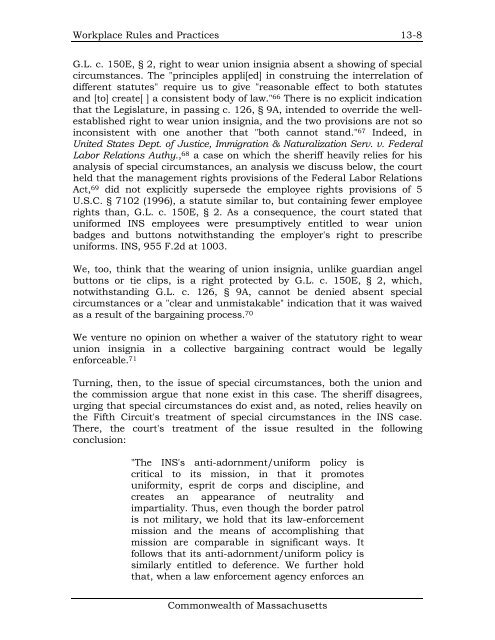Management Rights - AELE's Home Page
Management Rights - AELE's Home Page
Management Rights - AELE's Home Page
You also want an ePaper? Increase the reach of your titles
YUMPU automatically turns print PDFs into web optimized ePapers that Google loves.
Workplace Rules and Practices 13-8<br />
G.L. c. 150E, § 2, right to wear union insignia absent a showing of special<br />
circumstances. The "principles appli[ed] in construing the interrelation of<br />
different statutes" require us to give "reasonable effect to both statutes<br />
and [to] create[ ] a consistent body of law." 66 There is no explicit indication<br />
that the Legislature, in passing c. 126, § 9A, intended to override the wellestablished<br />
right to wear union insignia, and the two provisions are not so<br />
inconsistent with one another that "both cannot stand." 67 Indeed, in<br />
United States Dept. of Justice, Immigration & Naturalization Serv. v. Federal<br />
Labor Relations Authy., 68 a case on which the sheriff heavily relies for his<br />
analysis of special circumstances, an analysis we discuss below, the court<br />
held that the management rights provisions of the Federal Labor Relations<br />
Act, 69 did not explicitly supersede the employee rights provisions of 5<br />
U.S.C. § 7102 (1996), a statute similar to, but containing fewer employee<br />
rights than, G.L. c. 150E, § 2. As a consequence, the court stated that<br />
uniformed INS employees were presumptively entitled to wear union<br />
badges and buttons notwithstanding the employer's right to prescribe<br />
uniforms. INS, 955 F.2d at 1003.<br />
We, too, think that the wearing of union insignia, unlike guardian angel<br />
buttons or tie clips, is a right protected by G.L. c. 150E, § 2, which,<br />
notwithstanding G.L. c. 126, § 9A, cannot be denied absent special<br />
circumstances or a "clear and unmistakable" indication that it was waived<br />
as a result of the bargaining process. 70<br />
We venture no opinion on whether a waiver of the statutory right to wear<br />
union insignia in a collective bargaining contract would be legally<br />
enforceable. 71<br />
Turning, then, to the issue of special circumstances, both the union and<br />
the commission argue that none exist in this case. The sheriff disagrees,<br />
urging that special circumstances do exist and, as noted, relies heavily on<br />
the Fifth Circuit's treatment of special circumstances in the INS case.<br />
There, the court's treatment of the issue resulted in the following<br />
conclusion:<br />
"The INS's anti-adornment/uniform policy is<br />
critical to its mission, in that it promotes<br />
uniformity, esprit de corps and discipline, and<br />
creates an appearance of neutrality and<br />
impartiality. Thus, even though the border patrol<br />
is not military, we hold that its law-enforcement<br />
mission and the means of accomplishing that<br />
mission are comparable in significant ways. It<br />
follows that its anti-adornment/uniform policy is<br />
similarly entitled to deference. We further hold<br />
that, when a law enforcement agency enforces an<br />
Commonwealth of Massachusetts
















